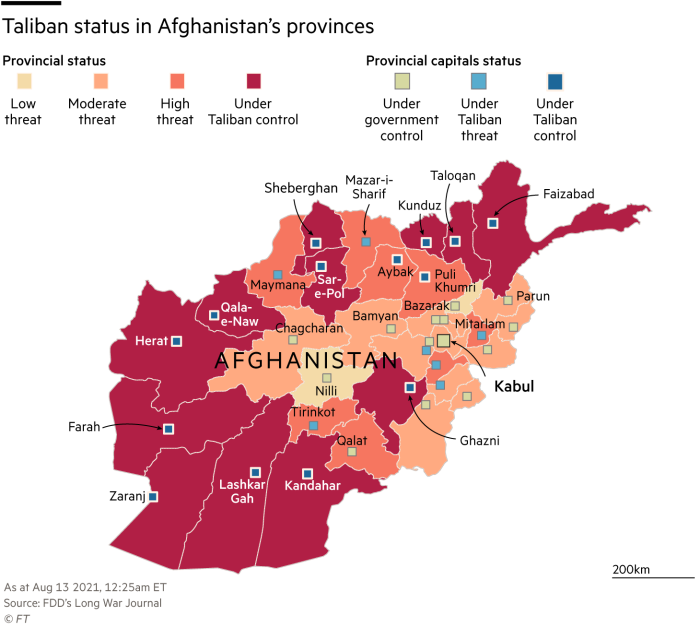The Taliban has captured Kandahar, Afghanistan’s second-largest city, and has begun encircling the capital Kabul, prompting Nato allies to convene a meeting in the wake of the US troop withdrawal.
The Islamist militia also captured Lashkar Gah in Helmand province after weeks of fierce fighting and now controls at least 14 of Afghanistan’s 34 provincial capitals. On Friday, four more cities had either fallen or were on the brink of being captured amid heavy fighting.
“Clearly from their actions, it appears as if they are trying to get Kabul isolated,” Pentagon spokesperson John Kirby told reporters on Friday, though he added the capital was “not right now in an imminent threat environment”.
The Taliban has seized much of north, south and west Afghanistan and is approaching Kabul in an effort to topple President Ashraf Ghani’s weakened government.
Jens Stoltenberg, Nato secretary-general, on Friday said the members of the transatlantic alliance had met and were “deeply concerned about the high levels of violence caused by the Taliban’s offensive, including attacks on civilians, targeted killings, and reports of other serious human rights abuses”. Nato is committed to a “political solution to the conflict”, he added in a statement.
But Ben Wallace, the UK defence secretary, warned that Afghanistan could again become a haven for international terrorists such as al-Qaeda, whose presence prompted the US-led invasion to oust the Taliban from power almost 20 years ago.
“I’m absolutely worried that failed states are breeding grounds for those types of people,” he told Sky News.
Wallace criticised Washington’s decision to stand by its target of withdrawing the remaining troops by the end of the month, saying: “I felt this was not the right time or decision to make because of course al-Qaeda will probably come back.” He also told the BBC that Afghanistan was “heading towards civil war”.

Kirby said the Pentagon still believed the Afghan military had significant advantages in the fight, including a capable air force, superior numbers and better training, and urged the government’s forces to use those advantages to roll back Taliban advances.
The US military is sending 3,000 troops to Kabul to help with the evacuation of American diplomats, a force Kirby said will be in place by the end of the weekend. But he noted the embassy will not shut, and rejected comparisons with the US evacuation from Vietnam after the fall of Saigon in 1975.
Boris Johnson, UK prime minister, acknowledged after a meeting of the Cobra emergency committee on Friday that the situation in Afghanistan was “deteriorating” and said he would use diplomatic and foreign aid pressure to influence the situation as much as possible.
“We’ve got to be realistic about the abilities of the UK — or any power — to impose a military solution in Afghanistan,” he said. “The idea of a combat solution is not one we should be pursuing right now’“.
Johnson added that he would “step up efforts to bring back Afghans who have helped international forces throughout the last 20 years”. He said that the UK could be “very proud” of what had been achieved in the country.
In addition to the 3,000 American troops headed to Kabul’s civilian airport, a back-up detachment of 3,500 soldiers are deploying to Kuwait in case the security situation deteriorates further. The UK will deploy a further 600 soldiers to speed up evacuations of some diplomatic personnel and Afghans who worked with British forces.
After storming across much of Afghanistan’s countryside in recent months, the Taliban have in the space of a week toppled a succession provincial capitals, altering the balance of power in the country.
After recently capturing Kandahar, Herat and Lashkar Gah, only Mazar-i-Sharif, a northern stronghold of local anti-Taliban warlords, and Jalalabad, to the south of Kabul, are the last big towns resisting the Islamists outside the capital. The Taliban now controls well over half of the country’s territory.
Even as the Islamist militants pressed their offensive, Taliban representatives were in Qatar for talks with a range of governments including the US, UK, Pakistan, China, India and several others.
In a statement issued late on Thursday, Doha said the participants in the talks had agreed on the need to “accelerate efforts to reach a political settlement and comprehensive ceasefire as quickly as possible”.
Zalmay Khalilzad, the US special representative for Afghanistan, demanded “an immediate end to attack against cities” and warned that “a government-imposed by force will be a pariah state”.
However, analysts doubted that the Taliban leaders in Qatar had control over the insurgent group’s ground troops, many of whom were operating autonomously in their local regions.
“The question is to what extent are Mullah Baradar [the Taliban co-founder] and his crew in Doha are going to be able to shape the mind of hardened fighters who have never been in an aeroplane,” said Rudra Chaudhuri, a lecturer at the King’s College London’s department of war studies.
“It doesn’t seem to me that a motorcycle-riding Taliban leader with a Kalashnikov is very interested in what Baradar says.”
Additional reporting by Sarah Provan and Sebastian Payne in London, and Katrina Manson in Washington

